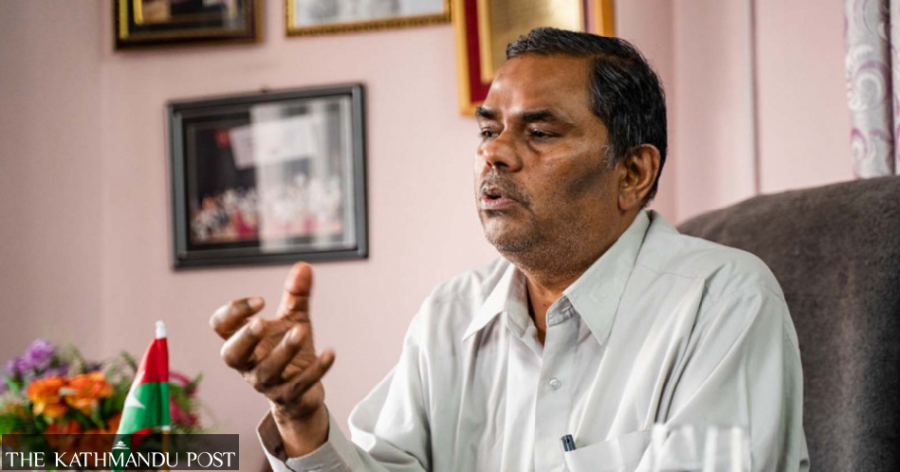Politics
JSP open to joining government, and ruling coalition is positive
Chemjong, a Janata Samajbadi leader, says talks are underway and formal discussion on next move will commence after PR lawmakers are decided.
Nishan Khatiwada
With the election results out and parties busy bargaining for forming a new government, the Janata Samajwadi Party has been keeping its options open on whether to join the government—and, if yes, then how.
Two electoral alliances led by the Nepali Congress and the CPN-UML went head-to-head in the last month’s parliamentary and provincial polls. But none garnered the majority seats—138—required to form the government.
Rakam Chemjong, a Janata Samajbadi Party leader, agrees that informal talks are underway and formal discussion about their next moves will commence after finalising their candidates for proportional representation (PR) lawmakers, on Saturday.
“We don’t want a deadlock in government formation just because of us. Neither will we be a hurdle in the process since we have not decided whether to join any of the alliances,” he said.
The party spokesperson Manish Kumar Suman said the voters have mandated the party to remain in the opposition. “But, if we decided to stay out of the government, we suspect, it would be difficult for the parties to form a government,” he told the Post.
“In fact, we are also looking for a political force that will address our core concerns—flexibility towards constitutional amendment, among other things. We are open to partnering with those who are positive to our concerns,” Suman added.
The party had allied with the CPN-UML in the elections, but its leaders are now saying the partnership has ended and they are open to new collaborations. JSP chair Upendra Yadav, speaking with journalists on Sunday in Biratnagar, said, “We supported the UML in some constituencies, and they supported us in some in return. That collaboration based on mutual cooperation has ended with the election’s completion,” he said. “Now we will proceed afresh.”
UML had supported the JSP in 17 federal constituencies and 42 provincial seats. “The partnership with the UML was solely for the electoral purpose,” said Chemjong.
Observers see such views by the party’s leaders as a strategic move of keeping its doors open for joining the Congress-led alliance—which is just two seats shy of a simple majority.
In the November polls, the Congress won 89 seats in total, the CPN-UML bagged 78 seats, the Maoist Centre 32, the Rastriya Swatantra Party 20, the Rastriya Prajatantra Party 14, the CPN (Unified Socialist) 10, the Janata Samajbadi Party 12, the Janamat Party 6, independent candidates 5, the Loktantrik Samajbadi Party 4, the Nagarik Unmukti Party 3, and the Rastriya Janamorcha and the Nepal Majdoor Kisan Party 1 seat each.
The House of Representatives is 275-strong—where 138 lawmakers are required for a simple majority.
In a nation where political upheavals have been more frequent, a comfortable majority is the only way out for a stable government. Chemjong, the JSP leader, said since a stable government will garner public trust and can perform well, seeking a bit more comfortable majority will be the best bet for the Congress-led alliance.
“And I think a stable government is needed when new forces with unclear ideologies have been elected to parliament. We are also in favour of a stable government,” Chemjong told the Post.
Observers said the possibility of Upendra Yadav coordinating and cooperating with Pushpa Kamal Dahal is high, if the politics of Yadav are any guide.
Yadav has reportedly called on Dahal a couple of times after the major poll results were out.
Tula Narayan Shah, a political observer who has followed Madhesh for decades, said, “If we look at the politics of Upendra Yadav, he and Dahal agree with each other on most issues. So, there are high chances of the two continuing partnership for forming a government,” he said.
“I think Yadav wants to join the current ruling coalition, and he is just waiting for a green signal from the latter. Now it is up to the Congress whether to bring Yadav’s party on board,” Shah added.
The ruling coalition has already decided to give continuity to their partnership, so the chances of the UML forming a government look slim. The Congress-led alliance has been keeping patience and looking for ways to cobble a comfortable majority, say Nepali Congress leaders.
Meen Bishwakarma, a Nepali Congress leader, said that his party has been deliberating over forming a safe majority government, so the JSP could help us achieve that.
“Discussions are underway with JSP leaders as well. If the party agrees to work with us without putting tough conditions, then we will bring the party on board,” Bishwakarma told the Post. “However, if the situation compels, we are also open to forming a government with a simple majority.”




 8.67°C Kathmandu
8.67°C Kathmandu














